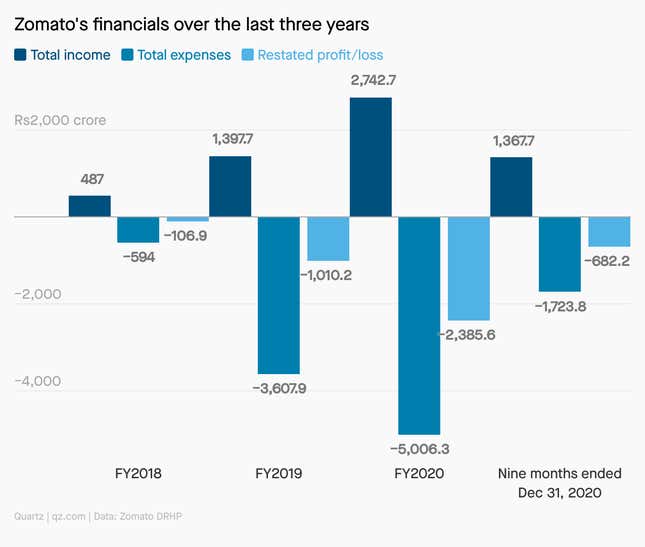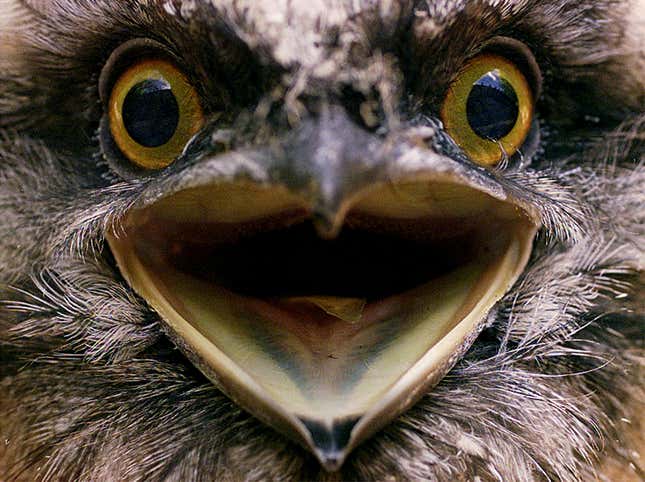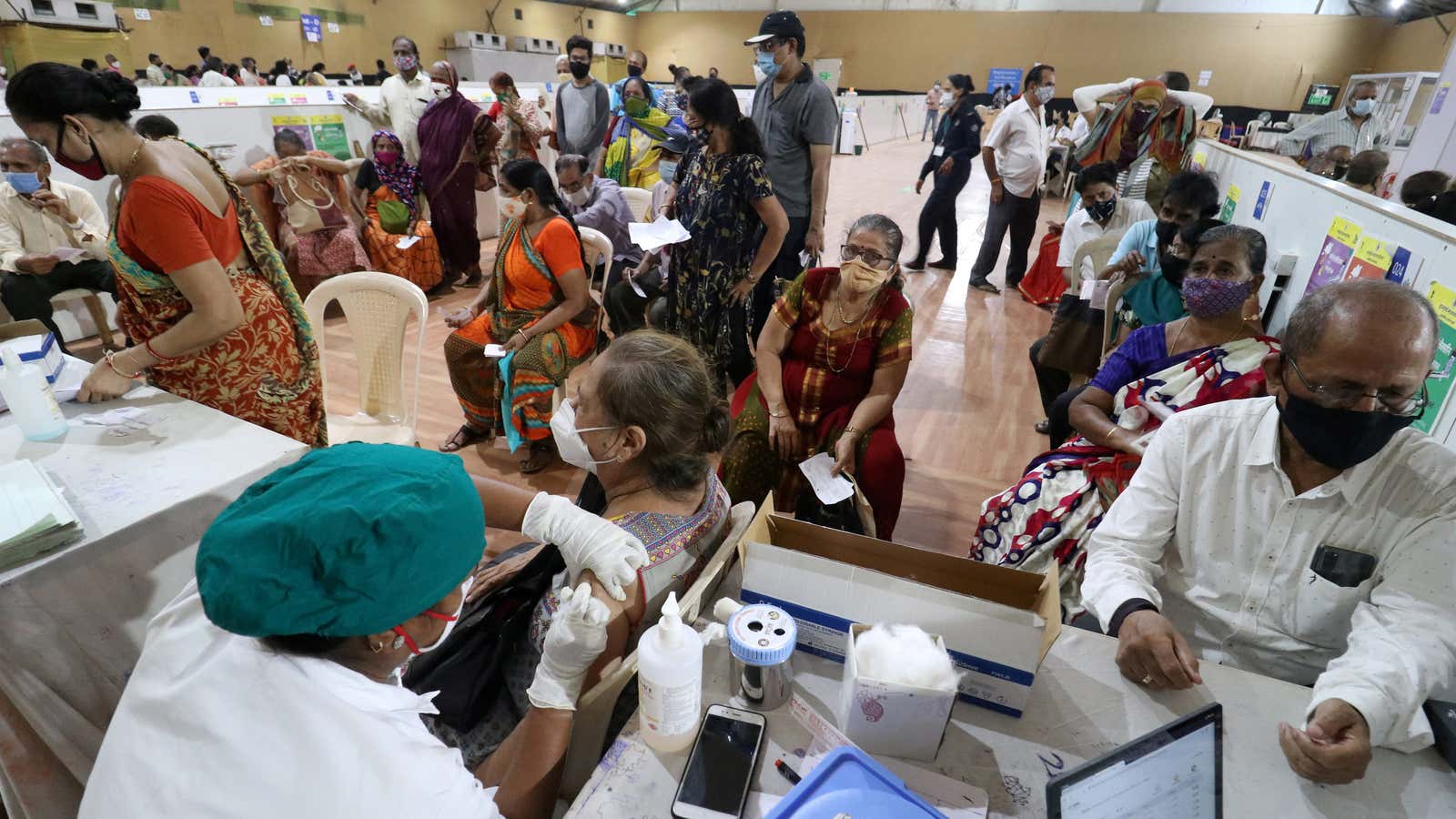Good morning, Quartz readers!
Here’s what you need to know
Mumbai is closing its vaccination centers for three days. With inoculations due to open to all adults in the country May 1 (see more below), municipal officials said there aren’t enough jabs. Separately, Bharat Biotech said it will lower the price of Covaxin for states.
Amazon continued the trend of terrific tech earnings. The company’s quarterly sales soared 44% and revenue topped $108 billion.
Beijing said China’s population grew last year. The official announcement contradicts earlier reports of a decline. Detailed census data has not yet been released.
Alexei Navalny lost an appeal on his recent defamation conviction. The Russian dissident is currently serving a two-and-a-half year sentence from a separate case. Meanwhile, Navalny’s allies said the Kremlin’s crackdown on dissent is forcing them to shutter 40 regional offices.
Daimler Truck and Volvo are teaming up on hydrogen fuel cells. The joint venture will begin production in Europe in 2025.
Uber wants to hire 20,000 more UK drivers. Following a court ruling in February, the new recruits will be classified as workers, not self-employed. Meanwhile, shares of Uber and Lyft crashed after the US labor secretary said most gig workers should be classified as employees.
A German court ruled the country’s climate law is insufficient. Because the legislation doesn’t contain details on emissions cuts beyond 2030, the court found it violated the freedoms of young people.
What to watch for
India was supposed to open vaccinations to anyone aged 18 and up on May 1. However, with jabs scarce, most states have pushed back that timeline. Roughly 23 million Indians have already been vaccinated—a figure that’s not even 10% of the 300 million the government aims to inoculate by August in a nation of more than 1.3 billion. Moreover, when slots do finally open up in the coming days and weeks, hesitancy could persist due to fears over efficacy and a lack of data transparency.
Meanwhile, cases have risen steadily over the last 10 days and thousands of Indians continue to lose their lives while waiting on states to procure vaccines in a disorderly dose rollout. The confusion is likely to continue, as India has left the decision on whether to subsidize vaccinations up to individual state governments.
On April 27, co-chairs of the US Senate India Caucus John Cornyn and Mark Warner asked president Joe Biden to offer a lending hand to countries that have been badly hit by the Covid-19 pandemic. Calling the situation in India “alarming” in their letter to Biden (pdf), the duo said, “US government agencies—both civilian and military—should be mobilized to lead an international response to the pandemic.”
Charting Zomato’s IPO ambitions
Zomato, India’s 12-year-old food delivery company, is ready to deliver on its IPO promises. It’s starting by laying its financials bare.

Started by IIT graduate Deepinder Goyal, the company was valued at $5.4 billion during its latest funding round in February. So far, Zomato has raised over $2 billion—half of which was in the last year alone. Still, despite its illustrious backing, Zomato, like most of its peers, has a notorious reputation for losing money.
Chloé Zhao’s challenge to Chinese beauty standards
Although Chloé Zhao’s Oscars win has largely been censored in China, her chill, no-makeup look at the awards ceremony has become a hit among many Chinese feminists, who say Zhao made them feel they can also ditch cosmetics and stop appealing to mainstream beauty standards in the country.
China has a set of rigid standards for women’s appearance, prompting online slimming challenges that encourage young girls to pursue body shapes that allow them to wear children’s clothes, or have waists with a width similar to the shorter side of a piece of A4 paper (around 21 cm). As such, Zhao’s no-makeup look is a much-needed endorsement for women in China, where few public figures dare to break away from traditional beauty requirements.
✦ The meaning of cool looks different than it ever has, but it’s still as influential as ever. Our field guide on the new cool is just one of many we’ve created to keep members in the know. Don’t have a Quartz membership? Try it free for a week!
You asked about how long vaccines were effective
Why is the effectiveness of Covid-19 vaccines so short-term (six months to one year) compared to other vaccines that are for life?
For now, we only have data for Covid-19 vaccines’ efficacy at six months because that’s how long they’ve been around. The earliest data comes from the earliest clinical trials testing these vaccines, which occurred a little under a year ago. Longer term, “there are two things that are primarily responsible for the durability of vaccine protection,” says Kevin Bonham, a senior research scientist at Wellesley College. “One is the vaccine itself and the other is the pathogen.”
Vaccines that provide the most protection, like the one for measles, work so well in part because the measles virus doesn’t mutate much. Vaccines like the annual flu shot provide less protection because the virus mutates year after year. Manufacturers rely on educated estimates as to how it will mutate, and then quickly design and make vaccines that confer protection.
Typically, coronaviruses don’t mutate often, but this pandemic has gone on long enough that the virus evolved new strains—the big question is whether existing vaccines will protect against them. So far, it seems like at least some of the vaccines available will, but scientists are still collecting data.
Handpicked Quartz
🏏 In crisis-hit India, a major international sporting event continues
🏢 How to move company purpose beyond empty platitudes
🖥 Online shopping is taking hold in mall-loving South Africa
🇳🇬 What Silicon Valley could learn from Nigeria’s Igbo entrepreneurs
😷 Desperate for oxygen and medicines, many Covid-hit Indians are falling prey to scams
👶 The US is poised to exit the small club of countries with no paid parental leave
Surprising discoveries

Scientists found the most Instagrammable bird. Photos of the so-ugly-it’s-cute frogmouth get the most likes.
A new type of tattoo only lasts nine to 15 months. You’ll still have to endure the pain of the needle.
Emperor Constantine got his finger back after more than 500 years. Or at least, his statue did.
A Real Madrid player may miss a semifinal match because of election duty. Marcelo was randomly selected to work the polls on the day of the game.
A women’s checkers match almost caused a diplomatic incident. An official removed a Russian player’s flag in the middle of the game, and she subsequently lost.
Our best wishes for a productive day. Please send any news, comments, semi-permanent tattoo suggestions, and your best bird photos to hi@qz.com. Get the most out of Quartz by downloading our iOS app and becoming a member. Today’s Daily Brief was brought to you by Itika Sharma Punit, Manavi Kapur, Ananya Bhattacharya, Liz Webber, and Jordan Lebeau.
